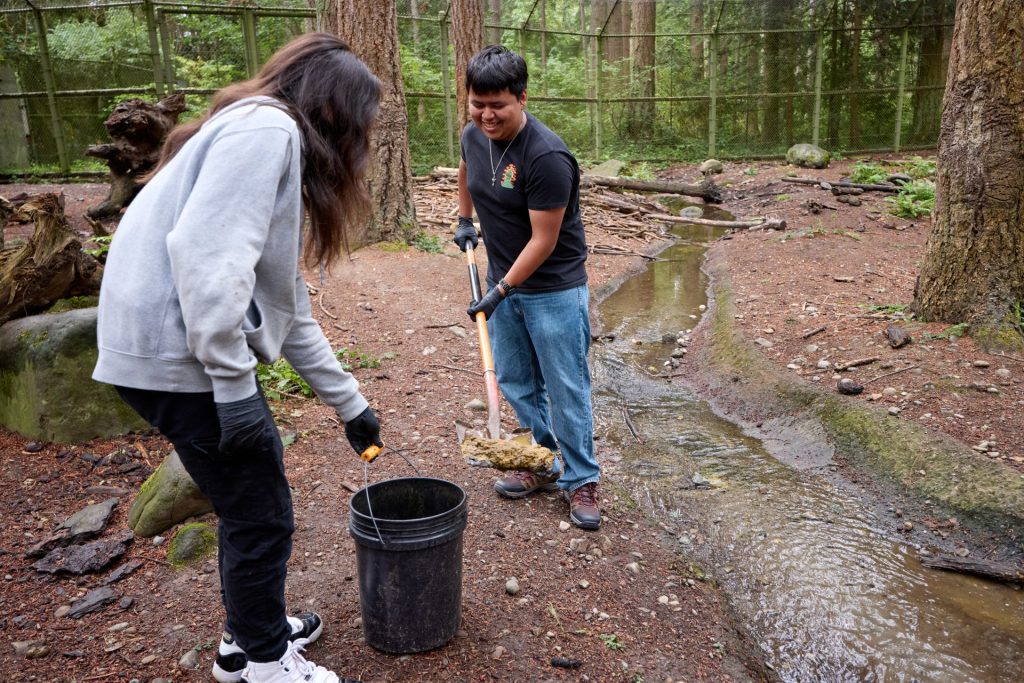A partnership between the Nisqually Indian Tribe and Northwest Trek grew stronger this year when tribal member and elder Rose Wells joined the wildlife park as its first-ever nature engagement fellow. The role allowed Wells to mentor tribal youth as they worked on-site at the park, learning about all the facets of its operations and potential career paths working with nature and animals.
For years, the Eatonville wildlife park has developed a partnership with the Nisqually Indian Tribe, accepting donations of salmon to feed the animals that call it home.
While the position is currently funded for one year, Wells and Northwest Trek hope future funding will allow it to continue—and perhaps offer a rotating position for members of other tribes.
“The opportunity opened my mind,” Wells said.
The position grew out of conversations between Nisqually elder David Stepetin, who has been crucial in establishing the partnership between the tribe and Northwest Trek, and Northwest Trek’s nature engagement curator Craig Standridge. After years of discussion and refinement, the position was funded for one year by “Weaving the Basket: A Collaborative Journey with the Nisqually Indian Tribe,” through Woodland Park Zoo’s Building Organizational Capacity to Foster Empathy for Wildlife Grant Program.
Standridge was eager to establish a program that would establish more space for Indigenous knowledge and experience at the park—and to offer something in return.
“I wanted us to give back. It’s about moving beyond land acknowledgements and actually doing something,” he said.
Once the fellowship was established, they found an appropriate fellow in Wells, who worked with Nisqually Tribal Council for years but wanted an opportunity to work with animals and nature.
“It was a rewarding opportunity,” she said.

Wells first worked with Northwest Trek staff, arranging guest speakers to educate them about the history of Chief Leschi and the tribe and land. These conversations were recorded and will be offered to future staffers.
Wells also worked with young people who volunteered to work at the park three days a week, with each day dedicated to a different role: facilities, education and animal care.
Wells, who shuttled the young people to the park each morning, can testify to their commitment.
“They loved it,” she said. “If they’re getting up at 6:30 a.m., that’s dedication.”
Under the watchful eyes of Wells and other staffers, young people planted trees, fed the animals and learned about the animals they were feeding such as wolves and bears. They set up trail cameras and reviewed the footage.
Several of the young people are interested in future careers dedicated to nature and caring for animals. Seeing that interest burgeon was one of the highlights of the position, Wells said.
“I enjoy working with kids and love watching them discover new opportunities for themselves,” she said. “On the way home each day they’d say what they’d learned. They liked everything. Every department was cool to them. They enjoyed every aspect.”
The young people spent four total weeks at the park throughout July.
While those young people’s sessions have ended—as has Wells’, as she left for a role in Nisqually’s Department of Natural Resources—the effort will continue. Another Nisqually tribal member has been hired and has begun work.
“Making the connection between our Nisqually students, the public and the animals of our traditional homelands is a win for all involved,” said Nisqually Tribe Chairman Ken Choke. “We hope to see this program continue for years to come.”
Top: Nisqually tribal member Joey Henry prepares to feed animals at Northwest Trek Wildlife Park. Story by Trevor Pyle. Photos from Northwest Trek Wildlife Park.
The post Wildlife park introduces tribal fellowship role appeared first on Northwest Treaty Tribes.